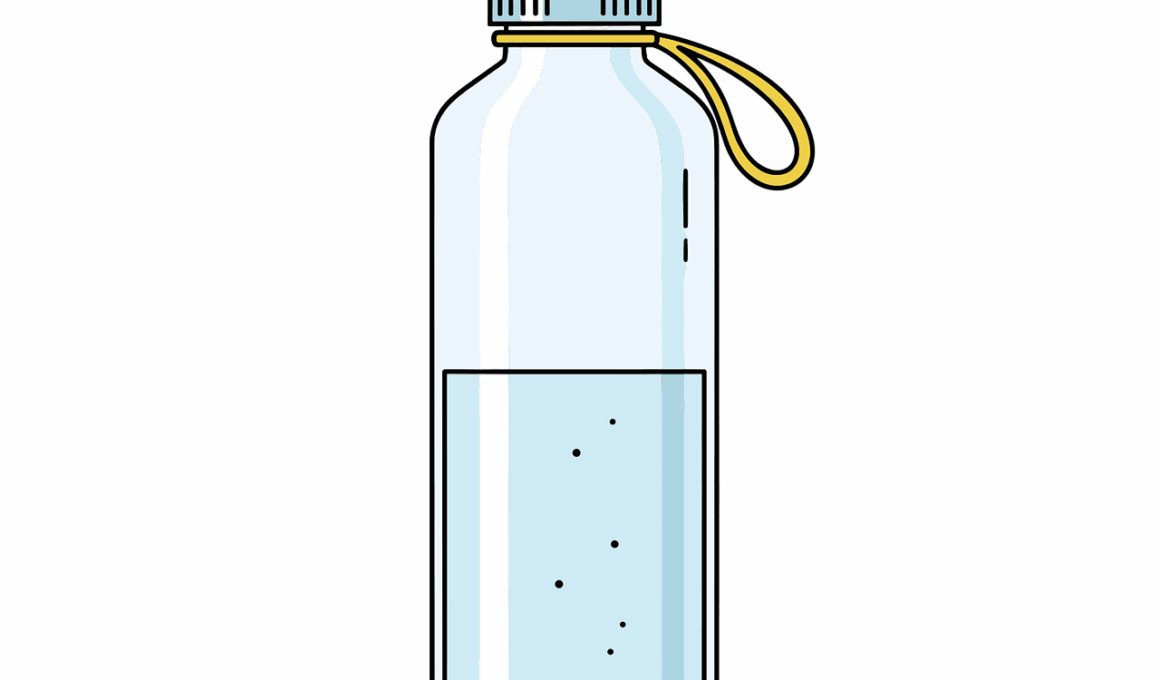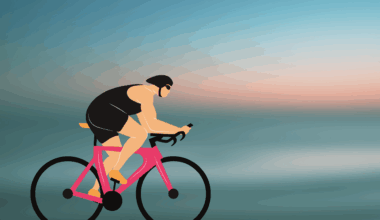How to Stay Hydrated During Intense Workouts
Staying hydrated during workouts is vital for maximizing performance and overall well-being. One of the best strategies to increase water intake is to make hydration a routine. Start your day with a glass of water first thing after waking up. This not only kickstarts your metabolism but also sets the tone for the rest of the day. Carry a reusable water bottle with you at all times. Fill it up before you leave home and keep track of how much you’re drinking throughout the day. Furthermore, add reminders on your phone to take sips regularly, especially if you tend to forget. Another effective strategy is to incorporate hydrating foods into your meals. Fruits and vegetables like watermelon, cucumbers, and oranges contain high water content and can help you stay hydrated. Consider infusing your water with fruits or herbs to enhance the flavor, making it more appealing to drink. Lastly, during workouts longer than an hour, consider using electrolyte drinks to replenish lost minerals.
Understanding Your Hydration Needs
It’s essential to understand that hydration needs vary based on several factors, including exercise intensity and duration. For instance, if you’re participating in high-intensity workouts for more than an hour, aim to drink at least 16-24 ounces of water prior to, during, and after your exercise session. Pay attention to your body’s signals; thirst is the first signal that you need water. Additionally, incorporating drinks rich in electrolytes can be a great solution for replenishing lost salts and minerals. These are essential, especially if you sweat profusely. The timing of your hydration can also play a critical role. Studies suggest drinking small amounts of water consistently throughout the workout, rather than large amounts infrequently. This helps maintain steady hydration levels. Overnight hydration is just as important; ensure you drink water before bed to prevent dehydration during nighttime. Keep a glass of water by your nightstand to encourage nightly hydration. Finally, consider keeping track of your urine color as an informal gauge of hydration levels; pale yellow means you’re likely well-hydrated.
Another helpful technique to ensure adequate water intake during workouts is to set specific hydration goals. These can vary from simply aiming to finish your water bottle before a certain time to scheduling hydration breaks during exercises. This strategy helps develop a consistent drinking habit that benefits performance. To make it enjoyable, involve your workout partner or team in friendly hydration challenges, encouraging everyone to reach their goals. Moreover, consider establishing your pre and post-workout water routines. For example, drink a specific amount of water at least 30 minutes before you start sweating. Post-workout, aim to hydrate for recovery. This dual-pronged approach promotes overall hydration and aids in muscle recovery. Implementing portion control on your water intake can also be beneficial, especially during intense workouts. Taking small, frequent sips is better than gulping down large quantities. This method prevents discomfort and improves absorption. If you’re not sure how much water to consume, use apps or hydration tracking devices to help keep you on course. Finding personalized hydration recommendations can greatly enhance your workout experience.
Mixing up your hydration sources can also keep you motivated to drink more. Besides plain water, explore a variety of alternatives such as coconut water, herbal teas, or flavored sparkling water. Each of these options can provide a refreshing twist while offering hydrating benefits. You can also try creating your own electrolyte drinks from home using water, salt, and natural fruit juices. This DIY approach allows better control over sugar usage and ensures you’re consuming natural ingredients. When out exercising, it’s helpful to carry electrolyte tablets that you can dissolve in water. This portable option simplifies refueling, especially for long biking or running sessions. Keep sports drinks and coconut water in your gym bag for convenience. Moreover, introduce a post-workout snack that includes water-rich foods. Greek yogurt, smoothies, and fruit bowls can significantly augment hydration levels after intense activities. Proper hydration also aids in preventing cramps and enhances overall energy levels. Lastly, encourage others around you to stay hydrated, creating a supportive environment that promotes health and wellness during workouts.
The Role of Temperature in Hydration
Temperature can play a crucial role in hydration levels during workouts. In warmer weather, our bodies lose fluids more quickly through sweat. Therefore, it’s important to adjust your water intake accordingly. Engage in both cool and ambient water consumption depending on your workout settings. Chilled water is often refreshing and encourages higher consumption during summer sessions. Conversely, warmer fluids can be more comfortable for drinking in colder months. Prepare hydration stations with cold water and, if necessary, a range of electrolyte drinks. Even the types of exercises can impact your hydration strategy. High-intensity interval training (HIIT) often demands more hydration compared to steady-state cardio. Monitor your energy levels and hydration needs, making adjustments as the seasons change. Additionally, consider wearing moisture-wicking attire that keeps your body cool and minimizes sweat loss during intense workouts. If exercising outdoors, try to avoid the hottest parts of the day when possible. Know your body and familiarize yourself with how it responds to different temperatures, as this will inform your hydration techniques and strategies for optimal performance.
Understanding how supplements and hydration interact is another essential aspect. While necessary for energy and muscle recovery, supplements can sometimes lead to dehydration, especially creatine and protein powders. Review guidelines on proper dosages and remain diligent about hydration when consuming these products. Make sure to combine supplements with ample water intake to promote optimal nutrient absorption and prevent discomfort. Explore options that promote hydration, such as BCAAs or even vitamin-infused waters. Another option is to integrate hydration supplements that complement your workout routine. These can accelerate hydration and replenish necessary minerals. Furthermore, consider engaging in post-workout recovery plans that prioritize both hydration and nutrition. Smoothies packed with fruits can provide hydration while delivering the necessary electrolytes. Customize shake recipes that include hydrating elements, like spinach or coconut water. Protein shakes can also be beneficial post-exercise, as they often require additional liquid. Track your hydration and supplementation habits and adjust based on workout intensities. Monitoring these variables can significantly impact your overall performance. Consider consulting professionals for personalized recommendations for enhanced workouts.
As you refine your hydration strategy, consider the importance of daily habits beyond workouts. Staying hydrated outside of exercise is essential for overall health and is often overlooked. Develop a schedule or routine that emphasizes drinking water throughout the day, even when not working out. This can significantly influence your body’s hydration level when you need it most. Mark specific times to drink water and make it a regular part of your daily activities. You might opt to drink before meals, during breaks, and before bedtime to ensure fluid consumption. Each of these small steps contributes to your hydration goals. Remember that hydration doesn’t solely come from beverages but also from your diet. Incorporating high-water foods can boost your hydration. Educate yourself on foods that contribute to hydration. Consider keeping a hydration log to notice patterns, helping you determine when and how much you drink. Share your daily hydration accomplishments with friends and family for added accountability. Ultimately, this holistic approach to hydration will markedly enhance your performance during those intense workouts, keeping you energized and ready to reclaim your fitness goals.
This comprehensive approach to hydration strategies will help improve your exercise performance and support overall health. Always remember to listen to your body signals regarding hydration, adjusting your strategies based on how you feel. Set realistic goals and gradually increase your water intake to create lasting habits. Implementing these strategies leads to improved workouts and better recovery, allowing you to enjoy a flourishing fitness journey. By staying hydrated, athletes can reduce the likelihood of injury, increases their endurance, and enhances their recovery times. Prepare your body for your workouts through knowledge about hydration needs specific to the intensity of your exercise routine. Your body will reward you with peak performance results when you provide adequate hydration. Consider joining hydration challenges or groups to stay motivated and accountable. Stay consistent with your efforts, and over time, hydration will become a natural part of your workout routine. In conclusion, focusing on hydration strategies significantly benefits your physical performance and recovery. Stay mindful of your water intake, personalize your hydration plans, and enjoy every step of your fitness journey. Your body deserves the most care to achieve optimal health and fitness.


